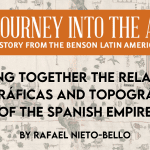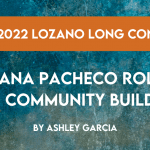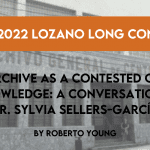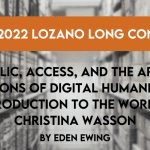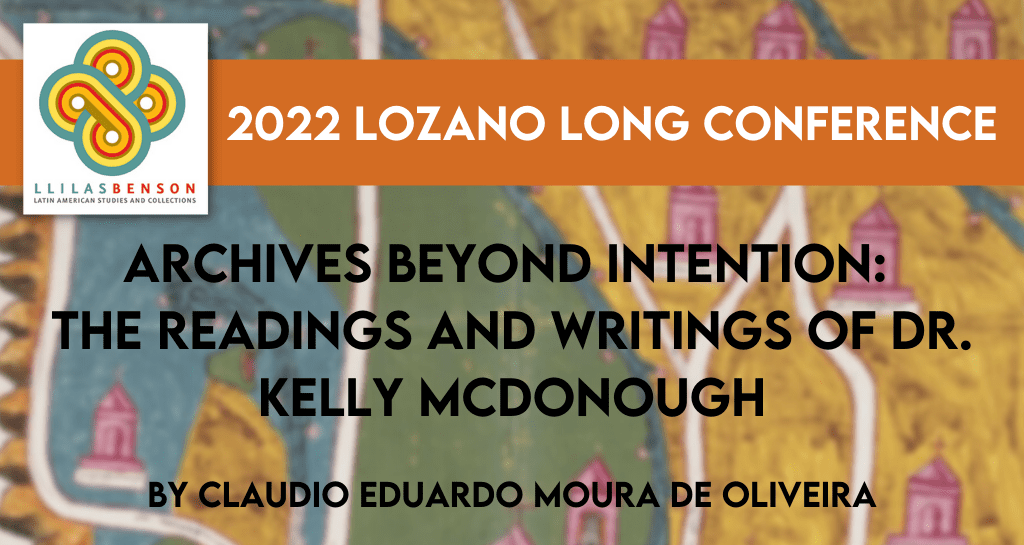
by Claudio Eduardo Moura de Oliveira
In honor of the centennial of the Nettie Lee Benson Latin American Collection, the 2022 Lozano Long Conference focuses on archives with Latin American perspectives in order to better visualize the ethical and political implications of archival practices globally. The conference was held in February 2022 and the videos of all the presentation will be available soon. Thinking archivally in a time of COVID-19 has also given us an unexpected opportunity to re-imagine the international academic conference. This Not Even Past publication joins those by other graduate students at the University of Texas at Austin. The series as a whole is designed to engage with the work of individual speakers as well as to present valuable resources that will supplement the conference’s recorded presentations. This new conference model, which will make online resources freely and permanently available, seeks to reach audiences beyond conference attendees in the hopes of decolonizing and democratizing access to the production of knowledge. The conference recordings and connected articles can be found here.
En el marco del homenaje al centenario de la Nettie Lee Benson Latin American Collection, la Conferencia Lozano Long 2022 propició un espacio de reflexión sobre archivos latinoamericanos desde un pensamiento latinoamericano con el propósito de entender y conocer las contribuciones de la región a las prácticas archivísticas globales, así como las responsabilidades éticas y políticas que esto implica. Pensar en términos de archivística en tiempos de COVID-19 también nos brindó la imprevista oportunidad de re-imaginar la forma en la que se llevan a cabo conferencias académicas internacionales. Como parte de esta propuesta, esta publicación de Not Even Past se junta a las otras de la serie escritas por estudiantes de posgrado en la Universidad de Texas en Austin. En ellas los estudiantes resaltan el trabajo de las y los panelistas invitados a la conferencia con el objetivo de socializar el material y así descolonizar y democratizar el acceso a la producción de conocimiento. La conferencia tuvo lugar en febrero de 2022 pero todas las presentaciones, así como las grabaciones de los paneles están archivados en YouTube de forma permanente y pronto estarán disponibles las traducciones al inglés y español respectivamente. Las grabaciones de la conferencia y los artículos relacionados se pueden encontrar aquí.
I first met Dr. Kelly McDonough as most graduate students meet professors: I emailed her and stopped by her office hours. We bonded over our favorite Zen tea, and she generously encouraged me to talk through aspects of my work with her. This meeting inspired me to add a whole new component to my project, the field of Indigenous Rhetorics, which is now central to my academic work.
Through her mentorship, I have come to learn and admire the many facets of Dr. McDonough’s work. At its core, her work revolves around a silence that is so loud and gets harder and harder. This is the deafening silence that resonates from the stolen land we now live in. In an academy centered around the written word and archives maintained by the dominant culture, Dr. McDonough transforms conspicuous historical absences into visible narratives that help us better understand our present.
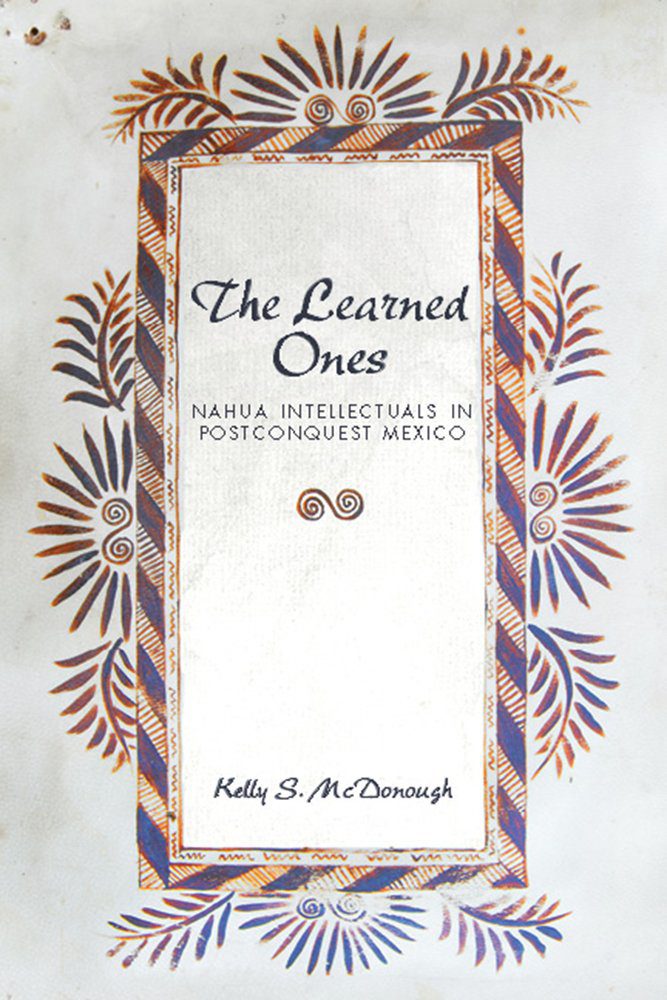
Specifically, Dr. McDonough documents Nahua intellectuality over the course of the past five hundred years. Her first book, The Learned Ones: Nahua Intellectuals in Postconquest Mexico, introduces us to the intellectual worlds of Nahuatl-speaking peoples. She tells the story of the Nahuas’ long relationship with the written word since the introduction of the Roman alphabet at the start of Spanish colonization in the Americas. The book is part of the ‘First Peoples: New Directions in Indigenous Studies series,’ a collaborative initiative of The University of Arizona Press, the University of Minnesota Press, the University of North Carolina Press, and Oregon State University Press to publish significant scholarship related to the First Nations.
The book introduces Nahua knowledge and writing through five chapters, each focusing on a different Nahua writer. Dr. McDonough examines a selection of 16th-century Nahuatl intellectuals that include: the first indigenous person in the Americas to write a grammar of their native tongue, a polymath, a historian, a playwright, and the only published female Nahua prose writer. The book also addresses –and seeks to change – the invisibility of past Nahuatl intellectuals not just among the Spanish and English-speaking population but also contemporary Nahuatl speakers. Interspersed within the chapters there are narratives of exchanges between the author and current Nahuatl native speakers learning for the first time about past Nahuatl-speaking intellectual production. In doing so, Dr. McDonough helps us draw connections between 16th-century Nahua written production and the contemporary production of indigenous knowledges by native peoples in collaboration with non-indigenous scholars.
For her next book project, Dr. McDonough has been drawn to the 16-century Relaciones Geográficas of New Spain (now Mexico) due to the central role that tlacuilos, or Nahuatl scribes played in their production. Titled Indigenous Science and Technologies of Mexico Past and Present: Nahuas and the World Around Them, Dr. McDonough’s book seeks to engage with past and present Nahua natural and technological knowledges. In the chapter dedicated to the Relaciones Geográficas, Dr. McDonough read silences and, in her own words, makes a collage of snippets from these documents. A methodological exploration, this chapter refuses to accept the limitations of a colonial archive and reads the Relaciones Geográficas’ records well beyond their intentions. Turning from illness to cure, Dr. McDonough reads the answers to the Spanish Crown’s questionnaire (the Relaciones Geográficas) and transforms the findings into a reflection on how to read lacking archival sources and use a creative reimagination in order to produce scholarly work. Dr. McDonough uses this methodological approach to look at the Relaciones Geográficas in order to find indigenous plant science and technologies not only in the few fragments one gets of indigenous presence in the Relaciones Geográficas–where they are often obscured–but also to highlight the intentionality of this knowledge and its practitioners.
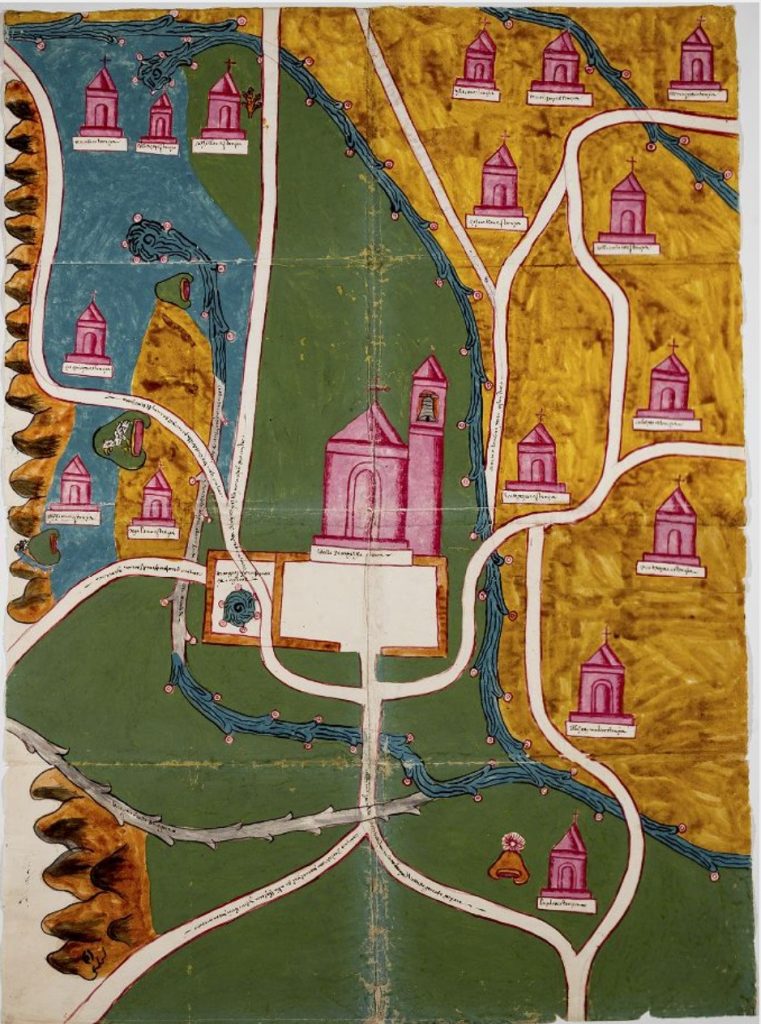
Dr. McDonough is also a leading scholar in the Digital Humanities realm: a commitment that organically has emerged from her determination to making past indigenous knowledge relevant for our present and our possible futures. She currently is contributing to not just one but two inter-institutional and international Digital Humanities projects. The first is the digitization of the Fondo Real de Cholula judicial archive in Mexico, the only surviving colonial archive of judicial documents in one of the few Ciudades de Indios in New Spain. The second project, “Unlocking the Colonial Archive: Harnessing Artificial Intelligence for Indigenous and Spanish American Historical Collections,” is developing a tool to read “unreadable” indigenous archival resources through a collaboration between the LLILAS Benson Latin American Studies and Collections, the Digital Humanities Hub at Lancaster University, and Liverpool John Moores University. In fact, Dr. McDonough’s work perhaps has its greatest reach via the Digital Humanities realm. My own interest in Digital Humanities led me straight to her work via the recommendation of my friend and colleague, Hannah Alpert-Abrams.
Dr. Kelly McDonough participated in the 2022 Lozano Long Conference as a commentator in the panel entitled “Modern Institutional Networks Visualize Early Modern Archives: The Case of the Relaciones Geográficas y Topográficas.” The Conference took place on February 24th and 25th, 2022, and celebrated the centennial of the Nettie Lee Benson Latin American Collection.
The views and opinions expressed in this article or video are those of the individual author(s) or presenter(s) and do not necessarily reflect the policy or views of the editors at Not Even Past, the UT Department of History, the University of Texas at Austin, or the UT System Board of Regents. Not Even Past is an online public history magazine rather than a peer-reviewed academic journal. While we make efforts to ensure that factual information in articles was obtained from reliable sources, Not Even Past is not responsible for any errors or omissions.
